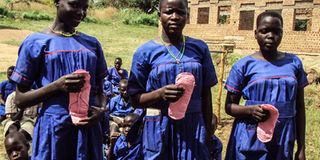Kapchorwa leaders urge govt to fulfil pledge on sanitary towels

Need. Pupils of Oci Primary School in Ajia Sub-county display their locally made reusable sanitary pads in 2017. FILE PHOTO
What you need to know:
- 40% : Is the percentage of girls that drop out of school in Sebei before they complete primary school, according to Kaserem Home of Talent, a community organisation.
Jessica Chebet, a Primary Six pupil, says she prefers to stay home during her menstrual period for fear of staining her school uniform.
“I fear to stain my uniform and be ridiculed because I don’t have sanitary pads,” she says.
Chebet, a pupil at Kaserem Primary School in Kapchorwa District, says most girls at the school use unhygienic materials when menstruating.
“We use torn clothes and sometimes newspapers. We also lack proper sanitation facilities, including water,” she says.
Caroline Nabuduwa, another pupil, says she lacks privacy.
“Whenever my period starts, I miss school because there is no privacy and toilets are also dirty,” she says.
While Barbara Chekwel, a Primary Six pupil at Gamogo Primary School, says government should provide free pads to school-going children to improve their menstrual hygiene.
“Most of our parents cannot afford to buy the pads for us monthly, so I appeal to the government to start buying pads for us because our parents are poor,” she says.
Mr David Eryatu, the district education officer, said Kapchorwa is among the top districts with high absenteeism rate in the country among girls, which he partly attributes to poor menstrual hygiene.
Mr Eryatu urged government to fulfill its pledge of providing free sanitary pads to improve retention and academic performance of girls.
“We got excited when the President said they would provide free sanitary pads but it is unfortunate that the pledge has never been fulfilled,” he said.
In 2015, while on a campaign trail, President Museveni promised that pupils and students could from 2016 get free sanitary towels, exercise books and computers if he is re-elected.
“I want all our daughters to attend school and remain there until they complete their studies. One of the reasons that force our daughters out of school is that when their periods start, they do not have sanitary pads. When they are in class, they soil their dresses. So they run away from school,” Mr Museveni said.
However last year, First Lady and Education minister Janet Museveni said if government is to do it, then it must be done in a sustainable way through a well funded national project.
Mr Sawani Shuni, the secretary of Kaserem Home of Talent, a community organisation, said more than 40 percent of girls drop out of school in Sebei before they complete primary partly due to lack of sanitary towels.
“Girls face a lot of challenges while managing menstruation, and this is one of the factors for high school dropout,” Mr Shuni said.
His organisation distributed about 1000 sanitary reusable pads to the girls from the different schools in Kapchorwa district last Friday.
The beneficiary schools include Kaserem,Gamogo and Chebelat primary schools, and Kawowo Secondary School.
The pads were donated by Young African leaders initiative (YALI) transformation fund in partnership with Ushindi Medical Services, Equality Uganda, Zenapacks, Cheap Build Limited and REF Uganda. The girls were also taught how to make reusable pads.
Mr Muhammed Labu,the head teacher of Kaserem Primary School, said training girls how to make pads will reduce school dropouts rates.
Mr Hillary Chesang, chairperson of the Kaserem School of Talent, called for sensitisation on menstrual hygiene to keep girls in schools.
“We no longer need a community where girls are looked at as an opportunity for bride price when they start experiencing their menstruation ,” he said. Mr Deo Walusimbi, the leader of ( YALI) cohort 39 Uganda Chapter, said provision of menstrual hygiene management facilities for girls is key.
“When a girl-child misses school for several days when she is in her menstruation, she won’t be able compete favourably with male counterparts,” he said. Mr Walusimbi added that provision of sanitary pads can reduce cases of teenage pregnancies in Sebei.



